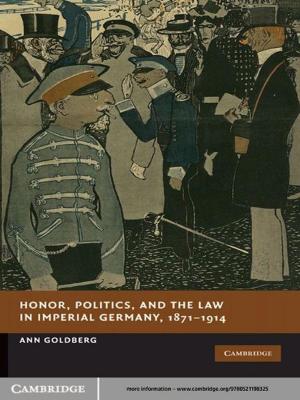Hitler versus Hindenburg
The 1932 Presidential Elections and the End of the Weimar Republic
Nonfiction, History, European General, Social & Cultural Studies, Political Science| Author: | Larry Eugene Jones | ISBN: | 9781316481851 |
| Publisher: | Cambridge University Press | Publication: | January 5, 2016 |
| Imprint: | Cambridge University Press | Language: | English |
| Author: | Larry Eugene Jones |
| ISBN: | 9781316481851 |
| Publisher: | Cambridge University Press |
| Publication: | January 5, 2016 |
| Imprint: | Cambridge University Press |
| Language: | English |
Hitler versus Hindenburg provides the first in-depth study of the titanic struggle between the two most dominant figures on the German Right in the last year before the establishment of the Third Reich. Although Hindenburg was reelected as Reich president by a comfortable margin, his authority was severely weakened by the fact that the vast majority of those who had supported his candidacy seven years earlier had switched their support to Hitler in 1932. What the two candidates shared in common, however, was that they both relied upon charisma to legitimate their claim to the leadership of the German nation. The increasing reliance upon charisma in the 1932 presidential elections greatly accelerated the delegitimation of the Weimar Republic and set the stage for Hitler's appointment as chancellor nine months later.
Hitler versus Hindenburg provides the first in-depth study of the titanic struggle between the two most dominant figures on the German Right in the last year before the establishment of the Third Reich. Although Hindenburg was reelected as Reich president by a comfortable margin, his authority was severely weakened by the fact that the vast majority of those who had supported his candidacy seven years earlier had switched their support to Hitler in 1932. What the two candidates shared in common, however, was that they both relied upon charisma to legitimate their claim to the leadership of the German nation. The increasing reliance upon charisma in the 1932 presidential elections greatly accelerated the delegitimation of the Weimar Republic and set the stage for Hitler's appointment as chancellor nine months later.















